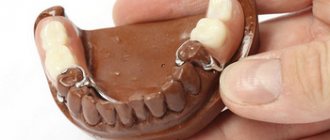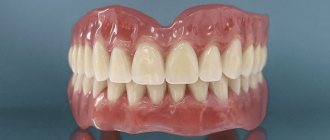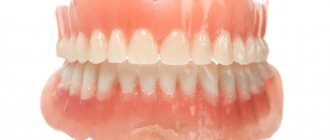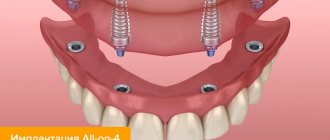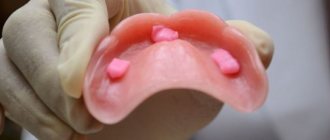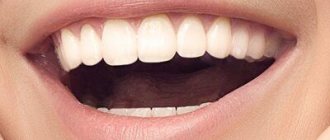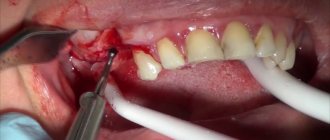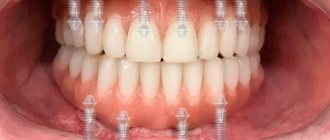- Complete removable dentures in Moscow
- Indications for use
- Types of removable dentures in complete absence of teeth
- Plate dentures for the entire jaw
- Removable dentures made of soft plastic
- Acrylic dentures for all teeth
- Removable nylon dentures
- Complete removable silicone dentures
- Clasp dentures for the entire jaw
- Pros and cons of complete dentures
- Preparation for prosthetics
- Manufacturing of complete removable dentures
- Fixation
- Care of complete dentures
- Complete removable dentures price
If we look at official statistics, almost half of the residents of our country by the age of 65 are faced with the problem of complete loss of teeth. In medical practice, this phenomenon is called adentia. This situation should not be ignored, since edentia is not just an aesthetic defect that can cause psychological discomfort in the patient and affect self-esteem. Losing teeth is dangerous because it triggers a series of more serious health problems: the process of grinding food worsens, which leads to dysfunction of the digestive organs, impairs intestinal function, and as a result, the functioning of all internal organs is disrupted.
The most progressive methods of restoring lost teeth are prosthetics on implants or the use of removable structures. Despite all the visible advantages of implantation, this method also has significant disadvantages. It may not be suitable for patients because it requires surgery, which may be contraindicated. And the second significant point is the high cost of all manipulations. An alternative, universal and suitable method of prosthetics for completely edentulous patients is the production and installation of removable orthopedic dental structures.
Removable dentures are distinguished by the fact that they can be removed and put on independently, at any time, without the involvement of specialists. There are two types of these structures:
- partially removable dentures;
- complete removable dentures.
Indications for use
As a rule, complete removable dentures are indicated for defects in a number of teeth, such as complete loss of chewing teeth. In addition, the pathological condition of the periodontium may be an indication. Severe periodontitis requires the installation of such structures; this will be the best solution for patients with this disease. The choice of the type of prosthesis depends on the specific case; the decision is made by the doctor together with the patient, based on a thorough examination of the oral cavity.
What is the price
The price depends on the amount of work and its complexity, but the RUTT clinic does everything to reduce the financial burden. The center offers the opportunity to pay for prosthetics in installments and take out a loan. You will be given documents for a tax deduction, and by subscribing to the newsletter, you will know about all promotions and discounts. Sign up on the website and get professional advice for free.
Free online consultation with a dentist
| Service | Price |
| Installation of a temporary cosmetic plate (butterfly) | from 11,000 rub. |
| Installation of a complete or partially removable lamellar denture (acrylic, 1 jaw) | from 32,000 rub. |
| Conditionally removable acrylic prosthesis on spherical attachments Rhein-83 for 1 jaw | from 121,000 rub. |
Consultation and diagnostics are free!
All prices Promotions
Types of removable dentures in complete absence of teeth
If there are no teeth left, the choice of design is significantly limited. Modern medicine offers the installation of prostheses on implants - this is the most reliable and most aesthetic method, but it is not available to everyone due to its high cost and indications. In this case, plate dentures remain - they are suitable for people of any age, if there are no allergic manifestations to the material used to create them. In the absence of teeth, all structures are similar in structure, but can be made of different materials. Let's decide what the pros and cons of different options are.
Plate dentures
Plate dentures, as the name implies, are a plate of different sizes. It acts as the basis of the structure, its basis. Fixing elements and artificial teeth are attached to it. Previously, such dentures were made exclusively from hard materials, but today dental technicians have a wider choice. This allows you to select products individually for patients, based on their needs and financial capabilities. But here it is necessary to remember that the material affects not only the comfort of wearing a denture, but also its service life.
Soft plastic dentures
Thus, acrylic products are considered the most durable. But since they are not always comfortable to wear, the formula of the material has been refined and improved. Complete removable dentures made of soft plastic were born. They are a combination of acrylic with the addition of additional components (for example, diamond chips). Their service life is very impressive, but due to their more plastic structure, they do not injure the gums, do not rub, and provide a tight fit.
Acrylic dentures
This type of prosthesis is the most popular - it is characterized by low price, aesthetics and ease of use. It consists of a base that covers the alveolar process and the body of the jaw, and artificial teeth attached to it. Before installing such a prosthesis, as in other cases, the oral cavity is first prepared for prosthetics, loose teeth are removed and the mucous membrane is treated, and then an impression of the jaws is made. Based on the impression, a primary model is created in the laboratory, which is adjusted and corrected after fitting. Acrylic or plastic prosthesis has the following advantages:
- an affordable way to completely restore teeth;
- ease of use;
- durability (7-9 years with proper care);
- uniform distribution of chewing load;
- quick adaptation period;
- lightness of the material, comfort of use;
- aesthetics and the ability to create a prosthesis that perfectly matches the color of natural gums;
- possibility of repair and correction;
- quick installation.
However, in order to decide which prosthesis is best to choose, you should know not only the advantages, but also the disadvantages of each type of design. For acrylic dentures, this is the possibility of an allergic reaction to the material, trauma to soft tissues during use, bad breath (acrylic is a porous material, bacteria can multiply in it), partial loss of taste, increased gag reflex, temporary impairment of diction and frequent need for correction. Most of these negative effects go away as you get used to the prosthesis, but some you have to put up with. To complete the adaptation period as quickly as possible, do not remove the denture at night.
Nylon dentures
The products are made from pink nylon, which is elastic and durable. They are similar to plate acrylic dentures, but differ from them in some parameters. This design perfectly imitates the gum and part of the alveolar process, it holds well and is suitable for sports enthusiasts. Such dentures are not removed at night even after the end of the adjustment period. A nylon prosthesis has the following advantages:
- hypoallergenic;
- high aesthetics;
- reliable fixation;
- low porosity, and, as a result, the absence of bad breath even after long-term use;
- flexibility, elasticity, comfortable use;
- durability (about 5 years);
- rare percentage of breakdowns.
The disadvantages of this type include the need for care of the prosthesis with the help of special means, the inability to repair in case of breakage, possible bone atrophy and mucosal injuries with prolonged use, uneven distribution of the chewing load (the flexible frame prevents this), the need for frequent correction and relatively high price.
In case of complete absence of teeth, implants are used to better fix the structure, and a metal arch is often used, which enhances the strength of the base. Thus, nyl dentures resemble dentures with a metal base and become even more durable.
Silicone prostheses
They are similar to nylon, but very different from them. Silicone is translucent; artificial – most often plastic – teeth are attached to a base made of it. Silicone dentures, as a rule, are used as temporary ones, because large gaps form between the teeth over time, and the service life of the structure is no more than two years, and it is rarely used for complete dentures. Their advantages:
- natural appearance;
- no allergic reaction;
- lightness and compactness;
- good fixation;
- softness of the material.
With prolonged use of the structure, atrophy of the alveolar bone and subsidence of the gums are possible, which is its significant drawback. In addition, they provide poor distribution of the chewing load and are difficult to maintain.
Clasp dentures
Clasp-type structures are practically not used in cases of complete edentia, since for strong fixation it will be necessary to create supporting surfaces. This requires additional time and financial expenses.
How does the withdrawal proceed?
The warranty period is up to three years. After this time, the structure must be dismantled. Sawing can be used to remove crowns, but due to the thinness of the plastic, this may not be necessary.
The withdrawal process is as follows:
- The structure is exposed to ultrasound. The properties of hardened cement will become much weaker.
- A Kopp apparatus is used. With pushing movements, the crown is tightened, but the tooth itself remains undamaged. This procedure does not cause pain; anesthesia is given at will.
- After the crown is removed, the teeth are processed. The remaining cement is removed and preparations are made for re-prosthetics.
After installing dentures, you should visit the dentist once every six months.
Many people are faced with the need for prosthetics, but do not know which design is best to choose. As you can see, plastic products are good in their own way, but the final choice should be made not only by the patient, but also by his doctor.
Pros and cons of complete dentures
Such designs are very popular; they have many advantages, including:
- Strength and elasticity . Prostheses are comfortable to wear, suitable for patients of all ages and safe. They are made according to an individual impression.
- High aesthetics . It is possible to choose the shape and color of teeth and gums as close as possible to natural ones. All this is selected on an individual basis.
- Easy to care for . Such structures are easy to care for; sometimes you just need to rinse them in running water.
The disadvantages include the following features:
- relatively long adaptation period;
- insufficiently stable fastening;
- feeling of discomfort when laughing, coughing or eating;
- not very long service life;
- food restrictions;
- violation of speech functions;
- the need for preventive regular examinations by a doctor.
Should plastic dentures be left in the mouth overnight?
The first thing you need to do after making dentures is to learn how to carefully put them on and take them off so as not to injure the mucous membranes and gums. The adaptation period will pass faster if you resort to rinsing and hot mouth baths several times a day without removing the system. There is no need to soak the structures in hot water.
The opinion that plastic dentures must be removed at night is erroneous. Although it is better to keep plastic dentures in a humid environment for the first months. This is due to the characteristics of the material used. Fresh plastic has the property of releasing monomer. If during this process air enters the structure, whitish stains will begin to form and the prosthesis will take on a marbled appearance. But this does not mean that it needs to be taken out of your mouth at night. The moist environment of the oral cavity is well suited to avoid this process.
It was also noted that the adaptation period passes faster if the structure remains in the mouth overnight. During this time, the movement of the dental system practically stops. This allows soft tissues to quickly adapt to a foreign body.
Sources used:
- Bazhanov, N. N. Dentistry. - M.: GEOTAR-Media, 2002.
- Eshleman JR, Moon PO, Douglass HB, Stall M. Retentive strength of acid etched fixed prostheses
- “Orthopedic dentistry. Textbook" (Trezubov V.N.)
Preparation for prosthetics
An important role in the manufacture of high-quality, comfortable designs is played by preparing the patient for prosthetics. The doctor conducts a detailed examination of the oral cavity, identifies individual structural features of the maxillofacial apparatus, and determines the characteristic features of the jaws. At this stage, the material for creating the future structure, the optimal shape, size and color of artificial teeth are selected.
Individual spoons are used. The composition of the mass for impressions is also selected personally. Based on the casts, a model of the jaws is made.
The finished product is made from wax or plaster models. This is quite painstaking work and is carried out using special equipment. In this case, it is important to clearly maintain the distance between the teeth, the depth of their fixation, inclination and many other parameters.
When trying on dentures, the dentist identifies possible nuances that prevent a tight fit. All comments are sent to the laboratory, where a dental technician adjusts the design.
Plastic crowns for front teeth: reviews
A temporary crown for an anterior tooth made from traditional acrylic monomer resin will, in most cases, have very modest aesthetics. Moreover, in order to obtain temporary crowns that are more or less aesthetically acceptable, they will need to be made only in a laboratory manner. But you should immediately take into account that such crowns will not have any gradient of color and transparency (as real teeth have - in the direction from the neck of the tooth to the cutting edge).
Temporary crowns for front teeth: photo
Patient reviews of such plastic crowns on teeth will always be negative. Please note that crowns do not have the gradient of color and translucency that real teeth have. Such crowns are only suitable as temporary structures at most - for the duration of the manufacture of permanent crowns in a dental laboratory, i.e. for about 2 weeks. If you plan to make plastic crowns for a longer period (for example, 2-3 months or even up to 2 years), then they should preferably be made from Multi-PMMA plastic.
Fixation of PMMA crowns on the front teeth (video) –
As you can see, the aesthetics of milled PMMA crowns can be several orders of magnitude better than traditional plastic crowns (made from acrylic resin). We have already said above that in this case, better aesthetics can be achieved by using multilayer PMMA discs (abbreviated “Multi-PMMA”). Look at the photo below: a dental technician holds a multi-layer PMMA disc with single crowns made from it. Note the gradient of color and transparency of both the disc itself and the crowns.
Quality of crowns made from multilayer PMMA discs:
Manufacturing of complete removable dentures
The manufacturing process of both acrylic and nylon removable dentures occurs in several stages: taking impressions of the gums, casting a plate, welding teeth to it, and fitting the dentures to the patient’s jaws.
Acrylic dentures are produced by injection molding, and nylon ones are produced by hot injection under pressure. The latter method requires expensive modern equipment and qualified specialists who can work with such equipment. This has an impact on cost, and therefore nylon dentures are much more expensive than acrylic ones.
Where to put
In Moscow, placing a removable acrylic denture on the jaw is not difficult. But making a system in a tiny laboratory is one thing, but making it in a modern one, equipped with the latest technology, is quite another. Shrinkage of acrylic plastics can reach 6-8% and only careful adherence to technology can reduce it to a minimum. A well-equipped laboratory is suitable for this, but a small one is not. Shrinkage determines how accurately the prosthesis “fits” on the jaw.
MCDI ROOTT has its own laboratory, orthodontists and laboratory assistants work in one team. New equipment and experienced doctors guarantee the quality of prostheses.
Care and storage
Dentures must be periodically removed from the mouth and cleaned. It's great if you do this every time after eating, but if this is not possible, you can rinse them in the morning and evening. Full dentures can be left in your mouth overnight, but it is best to remove them to give your gums a rest. In this case, before putting it in a special box, you need to thoroughly clean the prosthesis - rinse with boiled water, treat with an antiseptic solution or brush. It is recommended to have it professionally cleaned twice a year.
There is an opinion that the prosthesis should be stored in water or in a special solution. This is not so - a similar method was suitable for rubber prostheses, but modern technologies have made it possible to move away from it. Now it is enough to wrap the prosthesis in a cotton cloth and put it in a special box, where it will be protected from the sun, mechanical damage, heat and chemical influences.
Fact No. 1: acrylic often causes allergies and irritation of the mucous membranes
An acrylic denture is a removable device made of a synthetic polymer or cold-curing plastic, which contains quite a lot of residual monomers (on average 0.2%, but if the polymerization technique is violated, this figure increases to 8%). Monomers are toxic1, which is why those who wear acrylic devices are quite likely to develop allergies, allergic stomatitis, gingivitis, periodontitis, and even intoxication of the body. It should also be noted that the acrylic material itself is quite hard, which is why the prosthesis can rub the mucous membrane and injure it not only at the adaptation stage, but many years after the adaptation has passed, causing irritation and the appearance of ulcers. This is why some particularly sensitive patients cannot come to terms with the need to wear acrylic dentures.
The likelihood of allergies is quite high
Read the article on the topic: TOP 5 best manufacturers of acrylic dentures. How not to make a mistake in choosing and give preference to safe brands?
Some scientists claim that acrylic, which contains a large number of micropores, can cause the development of tumors in the oral cavity. Micropores are formed during the stamping of plastic and during its shrinkage. It is in them that during operation microbes become clogged, which gradually multiply and become the cause of the development of the inflammatory process.
Cost of complete removable dentures
| Name | Price from |
| Consultation with a specialist (included in the manufacturing cost when ordering a prosthesis) | 500 rub. |
| Cost of complete removable dentures for both jaws | 60,000 rub. |
The cost of services is determined individually for each patient, since the individual characteristics of the patient’s oral cavity play a key role in the manufacture of structures. Factors such as the anatomical structure of the maxillofacial apparatus, the chosen type of structure, the material of its manufacture and methods of fixation, the shape and color of artificial teeth are taken into account.
Denta Labor dental laboratory produces complete removable dentures of excellent quality. Our laboratory has created all the conditions to produce high-quality prostheses with a long service life. You can check prices for removable dentures by phone +7 (495) 162-08-25.
Promotion! When paying in advance the full cost of making the prosthesis, the cost is reduced by 2000.
Which is better
The main characteristics of acrylic, nylon and Akri-Free prostheses are presented in the table below.
| Property/material | Plastic | Akri-Free | Nylon |
| Life time | 2.5-5 years | 5-7 years | 1-5 years |
| Aesthetics | average | high | high |
| Fixation | satisfactory | good | unsatisfactory |
| Dimensions | large | compact | compact |
| Repair | available | available | not possible |
| Flexibility | low | optimal | high |
| Strength | satisfactory | high | satisfactory |
| Allergy | possible | No | possible |
Among modern removable covering structures, products made from Acri-Free are considered optimal. Compared to them, plate apparatuses are very large, heavy, change taste perception, and require adaptation over the course of 2 weeks. Nylon quickly loses its shape, aesthetics, and quality of fixation. They will soon have to be changed, while devices from Acre-Free can simply be adjusted.
